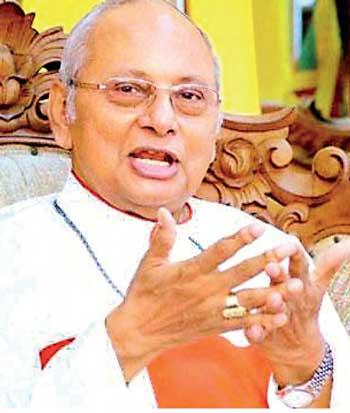Reply To:
Name - Reply Comment
 For the last couple of years since the tragic Easter Sunday attacks, some sections of the Catholic church led by Cardinal Malcolm Ranjith and civil society groups have been wanting us to believe that nine Islamist suicide terrorists, having pledged allegiance to the transnational Salafi Jihad terrorist group, Islamic State, blew themselves up killing 250 locals church goers and foreign tourists in order to bring to power an ardent Sinhala Buddhist nationalist Gotabaya Rajapaksa.
For the last couple of years since the tragic Easter Sunday attacks, some sections of the Catholic church led by Cardinal Malcolm Ranjith and civil society groups have been wanting us to believe that nine Islamist suicide terrorists, having pledged allegiance to the transnational Salafi Jihad terrorist group, Islamic State, blew themselves up killing 250 locals church goers and foreign tourists in order to bring to power an ardent Sinhala Buddhist nationalist Gotabaya Rajapaksa.
 |
| Cardinal Malcolm Ranjith |
The quest for an elusive mastermind of the Easter Sunday attack is founded on this fanciful conclusion.
Easter Sunday attacks were not the first terrorist attacks in Sri Lanka. But, they were the first since the LTTE massacres of worshippers in Kattankudy Mosques in 1990 to target ethnic minorities. That very tragedy has been exploited by self-interested groups, who have a strong innate grouse with the very foundation of the Sri Lankan State to undermine it and smear its security apparatus.
Now, it might help the American Ambassador to tell Cardinal Ranjith who the masterminds of the latest terror plot targeting Israeli tourists in Sri Lanka. Had the local intelligence agencies made those findings publicly known before the American travel advisory, one could safely bet that the usual chattering classes and other self-interested imbeciles would have cried blue murder of yet another plot to stir ‘Islamophobia’ by the Rajapaksas- or the “deep state’.
The JVP and NPP, including its President Anura Kumara Dissanayake, just like any other opposition political party, tacitly and actively contributed to perpetuating this toxic lie.
Now in power, they should get their act together.
There are few things the NPP - like any commonsense government – could do.
First is the most basic: They should recognise that the threat of Islamist terrorism to Sri Lanka is real and is the most likely source of a future terrorist attack. However, a succession of Sri Lankan governments had a problem with coming to terms with this reality.
It was the lack of political consensus on how to address the Islamist extremism in the country that ultimately led to the security lapses due to the absence of clear political guidance and finally contributed to the Easter Sunday attacks.
National intelligence services
Second, Sri Lanka should reconfigure its national intelligence services to confront this particular transnational threat. That the Sri Lankan intelligence services have to be tipped off by the Indians of the latest terror plot on our soil and the Easter Sunday attack itself reveals the glaring inadequacies of the intelligence network. SIS and intelligence arms of tri forces excelled in building a competent intelligence network during the latter stage of the Eelam war. However, though the nature of the threat has changed since then, the intelligence services have not grasped the full extent of the changing security environment.
That it had failed to do so, even five years after the Easter Sunday attack, may also suggest misplaced and politicised priorities clouding itself from the real security threat.
Witch-hunting competent intelligence officials, most recently Suresh Salley- over a ludicrous allegation made by an asylum seeker, Asad Maulana, presumably to strengthen his asylum application- would only discourage the dedicated members of the intelligence services.
Sri Lanka should reinvent its intelligence agencies to monitor, intercept and pre-emptively act against the Islamist extremist threat. That might require diverting a portion of resources previously dedicated to confronting LTTE terrorism.
That would also require a larger cadre of Muslim ranks and files to be enlisted, considering the unique religious dimension and local knowledge required.
Third, transnational terrorism cannot be fought alone. It requires cooperation and collaboration with the international counterparts. The recent episode would reveal how the lack of cooperation and communication would haunt it.
On October 7th, Sri Lankan intelligence services were tipped off by the Indians about a possible terror threat. The government says the actions were taken, and security was beefed up afterwards. However, no communication was made with international peers with better experience in combatting a threat of that kind. Nor were foreign missions informed of the intelligence reports. The result was the American embassy pre-empting with a travel advisory, followed by other countries of the Five Eyes intelligence network and even the Russians. This unfortunate eventuality could have been averted had there been regular communication and cooperation with the foreign partners. Sri Lanka should invest in collaboration and coordination with the international peers and formalise that cooperation.
Fourth, training on less intrusive intelligence surveillance and policing would help the security forces. After the travel warnings, television footage showed STF commandoes in UniBuffels manning checkpoints, reminiscent of the height of the Eelam war. That is not how you conduct security policing in peace times, more so in tourist hotspots. That terrorises civilians, predominantly the ethnic minorities in the area and scares away tourists. Overdoing security is counterproductive, as much as underperforming it. The local counterparts can probably ask how agencies like Shin Bet conduct their policing activities, especially in its Arab majority areas.
Fifth, a degree in foreign policy commonsense would always help. A day after the travel advisories, President Anura Kumara Dissanayake met the Iranian ambassador in Colombo. What do the Americans and Israelis think? What on earth is realistically the foreign country being cited as behind the attack?
Iran has a history of orchestrating attacks on Jewish targets around the world, including the 1994 bombing in Buenos Aires, Argentina, of a Jewish community centre killing 85. Recently, American security agencies beefed up security around synagogues, fearing Iran-instigated attacks in the wake of the Middle Eastern crisis.
Meeting with Ambassadors
Then, the president met with the ambassadors of Myanmar, where the military junta is massacring its people and South Africa. How many tourists are we receiving from these two countries?
Probably given the sense of urgency, he should have met the diplomats from the EU and the key source destinations of Sri Lankan tourism, which he met nonetheless later.
It is refreshing that Sri Lanka’s loudmouth and often empty foreign policy activism has somewhat been muted under this government. Its desire to not be seen as anti-Western might have helped shift to a saner approach. Still, small miscalculations could be misconstrued by the countries that matter in the international system. That should be avoided.
Last but not least, in the wake of travel advisories, local politics could not restrain their temptation. Mujibur Rahman, an SJB stalwart from Colombo, was heard questioning why the security forces protect the Jewish places of worship in Colombo and other places in the country? The answer is clear: That is because a bunch of Islamist terrorists are threatening to blow them up-- and bring a foreign war to this country.
Another SJB candidate from Weligama warned in his X account the Isralies not ‘to illegally occupy our land’ in the South! Knowing Sri Lankan politics, one would say these acts of petty politicking are aimed at winning a few thousand votes. But, they also feed into latent antisemitism in some quarters. One should be very careful when breeding monsters; they will come to devour you.
Sri Lanka should not import external grievances, which have become extremely venomous, into our midst and expect not to get bombed and blown up in the next terrorist attack.
We learnt it once the hard way, but Sri Lankans also have short memories, and its politics is brazenly self-seeking.
Follow Ranga Jayasuriya on X